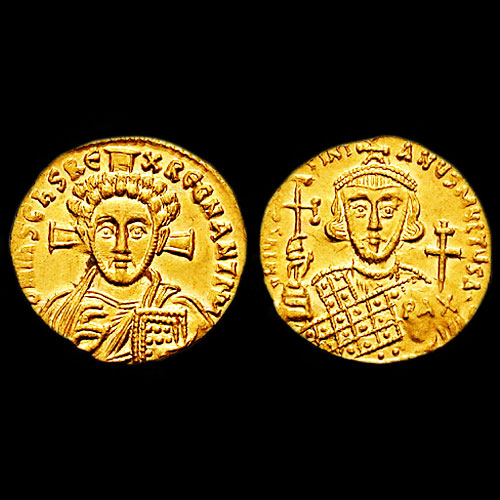Byzantine Empire
2018-06-19 Tue
Byzantine Empire, also known as Eastern Roman Empire, was a powerful civilization with origins that can be traced to 330 AD, when the Roman Emperor Constantine I dedicated a “New Rome” on the site of the ancient Greek colony of Byzantium.Though the western half of the Roman Empire crumbled and fell in 476 A.D., the eastern half survived for 1,000 more years, spawning a rich tradition of art, literature and learning and serving as a military buffer between Europe and Asia. The Byzantine Empire finally fell in 1453, after an Ottoman army stormed Constantinople during the reign of Constantin e XI.
Every Byzantine emperor minted their own coins, from Constantinople, the capital. The other mints in major provinces are Italy (Ravenna), Sicily (Syracuse), Anatolia (Antioch) and North Africa (Carthage and Alexandria).
Byzantine currency consisted of mainly two types of coins: the gold solidus and a variety of clearly valued bronze coins. Early Byzantine coins continue the late Roman conventions: on the obverse, the coin depicts the head of the Emperor and the reverse usually have a Christian symbol such as the cross, bust of Christ or a victory or an angel.
Image Source: Google Images
Latest News
-
Science and Technology on Indian Postage Stamps-3
2025-11-06 ThuThe next #stamp in the series issued by #India #post on 11 #September 1997 commemorates the 50th an...
-
Science and Technology on Indian Postage Stamps-2
2025-11-05 WedIn continuation of the stamp series issued by India Post on 11 September 1997, to celebrate the 50th...
-
Science and Technology on Indian Postage Stamps-1
2025-11-05 WedPalaeobotany is the scientific discipline dedicated to the study of fossilized plants and their hist...
-
Copper Double Falus of Malwa Sultan Ghiyath Shah
2025-11-05 WedMalwa Sultan Ghiyath Shah issued copper coins in two different weight standards: 80 rati series and ...
-
Malwa Sultan Ghiyath Shah's Silver One-Eighth Tanka
2025-11-03 MonGhiyath Shah was the ruler of the Malwa Sultanate. The son of Mahmud Khalji I, he had already govern...

